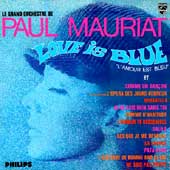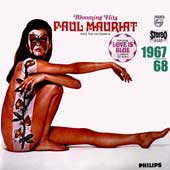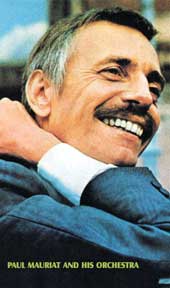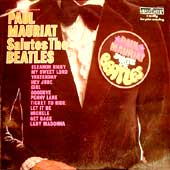INTERVIEW
Radio WMOH - Ohio, United States
Many, many thanks to Jim Howard Witt for
hosting this interview and supply this material, and for
granting permission to post it here.
Again, a thousand thanks!
Jim Howard Witt: And from Cincinnati you are going to...
Paul Mauriat: Gladly, after
Cincinnati, Chicago and after, many cities in *Texas*, then we
come back to New York, and a little tour to Canada, Montreal and
some city around New York..
JHW: Will you be doing any television while you are in the United States?
PM: Ehm.. no, some television ....
because when I arrive in the city, I take a little time for
..... and I can't do ... for myself. .
JHW: Merci, there would be any local television, television in the local level, or there would be any network television?
PM: The ... what?.
JHW: I imagine a lot of people would like to know, and I would like to know as well, how did you get your start in the music field and the television business?
PM: I start in ... I was 17 old,
and I decided one day to have my own orchestra, and then, with
this orchestra, we worked in cities of the south of the France
and foreign countries like Italia, Belgium, and Egypt. And I
come back to Marseille because I was born in Marseille, and then
I decided to go to Paris about 12 years before, 12 years ago.
And I began for accompaniment, for many artists such Charles
Aznavour, Dalidah, Salvador, Maurice Chevalier, and about 5
years ago, I signed up a contract to a record company in France,
*to my own orchestra*, between 45 and 50 *millichains*, and I
worked very hard because I have two-ways: one way for
arrangement for artists and with my own orchestra, and ... I was
very lucky because I get a very big success with "Love
is Blue", and now I am in the States just because "Love
is Blue" is a success here
JHW: Right, and how about "Love is Blue" come back as far as your arrangement, your arrangement of the song.
PM: First of all, I did not
composed "Love is Blue". "Love
is Blue" is written by a French composer Andre Popp. And
this song, you know, in Europe, you have each year a contest, a
contest song, and each country of Europe presents one song. And
this song was for Luxembourg, and it got little success, but I
liked very much this song and I took it for my LP and the LP
came to the States and it ... into Minneapolis and other states.

JHW: First, "Love is Blue" is so well-known in these areas as well because it sold quite a few copies, as so we say, and of course, and it made the local charts and the people like it very much, both young and old, because of your arrangement, it is a pretty arrangement, I must say. And now, of course you have your current hit ... and we're going to that in just a moment. Now, what is your favorite type of music? I know in your concerts you play everything between classical, semi-classical and pop. What is your favorite type?
PM: On stage is very different
because I have to ... many different ages, I have young people,
mid-young and old people. And I play many kinds of music like
pop music and rhythm and blues, and classic music, and I have a
fantastic commit by a French guy who both from France, he is
very good musician, a fantastic commit, but myself, I like very
much classic music, old classic music like Bach and Mozart, and
pop music, and above all I like rhythm and blues..
JHW: Like rhythm and blues, that's very, quite a contrast you see, with the old classics and the pop music and the rhythm and blues.
PM: I don't think so. Because now
rhythm and blues and pop music are like .. the classic music and
pop music are very close now. You know some group, British group
like rhythm and blues, play very often the classic music. and
*range* is *off the roff* but they take Bach and Mozart and now
I think is natural to like both.
JHW: In fact, lately, in fact, this song was popped all over the world and that's the last movement from Beethoven, "The Joy", oh they renamed it "The Song of Joy"
PM: Yes, and I think if Beethoven
was here, certainly will like it..
JHW: Is very good arrangement.
PM: Very, very good.
JHW: And of course, when they added the words to, it was a Spanish guy, Miguel de los Rios, who did a fantastic job on the vocalization.
PM: Yeah, uhm....
JHW: What ... you think, this is kind of a question that I know how the American men feel, about the new *midi length*. The dresses that are trying to bring down ...
PM: Yes.... I like very much, very
much when the fashion for the woman changed, I like the shorts,
how do you say it, the very shorts ....
JHW: Mini?
PM: Mini-shorts, and the French
... one year .. very long, ... and now in France is
big on the "midi". But I think it's on the five or six months,
it would be a very much success, because the fashion needs to
change very often.
JHW: In this country now, of course, the French fashion is starting to change, well the fashion designers are getting so much pressure on the American men to keep up with the style. Has it happened yet in France?
PM: Yes, is the same problem in
France because I have in home 10 or 12 suits that I can't use
now. Because the fashion in France change every year now. And
French people accept it, and I like to change very often, like
the woman.
JHW: It makes it better I think for a man, to have to change fashions, because its variety...
PM: Yes, yes, I agree.
JHW: Fashions are something else
sometimes, some of the clothes and now the ties are going back
to the wide ties again like they were in the 30s and the 40s.
JHW: What is the most embarrassing or unusual thing that ever happened to you during a live performance?
PM: Uhm... Maybe... when I was to
Japan for tour and I decided before the tour, to announce all my
program in Japanese and I learnt all my sentences in Japanese
but I did not understand what I said. When they, on the stage, I
had a very long sentence you know, after two or three words... I
don't remember and ... I don't understand what I say, is
impossible to continue. And I was on the stage, you know,
without one word ...
JHW: No *spread* on the stage for you then...
PM: Yeah and I come back after a
*stand*, to take the paper, to read the paper, and I come back
to the microphone and I forget again, and I come back two or
three times and that *day* it was for the last number and in the
end, I said "here is Love is Blue"
in English, you know.
JHW: I imagine they understood "Love is Blue".
PM: Yes. In English.
JHW: And of course, Paul Mauriat's American producer, ours... sometimes is called "A&R man", "Artist and Repertoire", they look for artists, material for artists and submit them to the artists if they want to produce their songs, or play the song in your case, and conduct the orchestra and Paul Mauriat is like our American producer, and many of you, a lot of you, might remember the song "Na Na Hey Hey (Kiss Him Goodbye)" done by the Steam as well as "Green Tambourine", now these songs were written and produced by Paul Leka and of course, he helped in Gone is Love...
PM: Yes...
JHW: a current hit right now on the American scene...
PM: Yes, but Gone is Love
it was written by an American woman from Los Angeles, Gloria Sclerov,
and the man is Joel Reed.. And I chose Paul Leka because I am
now an artist, a French artist, I need many American songs
because I am most an American artist than a French artist. And I
need many, many American songs but I can't realize in France
what kind of songs the public like, and Paul Leka choose many
songs for me. For the last recording, he sent about 17 songs and
I chose among these songs. And another is very important, Paul
Leka likes very much the technique, and him, and I am think we
are now good because he is in New York and very often, his
contact is his approve of the rock and roll music and he is very
up to date you know, and for France is very important.
JHW: How sure, I want the American public what's current and what's going on so you can write "on top" as they say. Of course you have a new album now, it's been out for a short time now, and has the title song, with the current song we were talking about, and you have a Mason Williams song on your album as well, don't you?
PM: Ehm... yes, "Classical Gas" I think you know this song because it was a big success in the United States some months or some years ago. And "Let it Be" by The Beatles and "Bridge Over Troubled Waters" by..
JHW: Simon...
PM: ... and Garfunkel, and about
the two titles and where in France is too ... big success in the
same times, in the same time, and for this reason I think it was
interesting to blend these two titles, and to make a medley of
these two titles.
JHW: And on the album you do each one separately and then you do a medley of songs and what I like about the two songs we .. is the free style you get away of the written notes and you get involved, you feel your way almost like jazz really.
PM: Yes, sometimes an arranger, an
arranger needs to write something just like..., you know, and
when I write an arrangement like "Let it Be"
or "Bridge over Troubled Waters" is
more easy and I am very happy. I hope the people will be too
JHW: What you come across quite
beautifully on the album, and if people don't have the album,
they should get it because this is a fantastic album, of course
it has the current hit songs, "Gone is Love".
JHW: We were talking about Paul Mauriat, who will be in concert at the Taft Auditorium in Cincinnati, Ohio, and we like to thank him for taking his time to talk to us, and welcome again to Cincinnati, and wish you success on the rest of your tour.
PM: Thank you very much, and I
would like to be back soon.
JHW: I hope you can come back to Cincinnati again.
PM: Thank you very much.
JHW: Thank you now. This is Jim Howard reporting from Cincinnati, Ohio.








